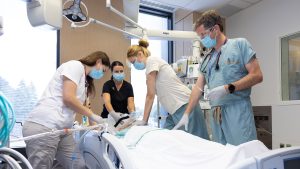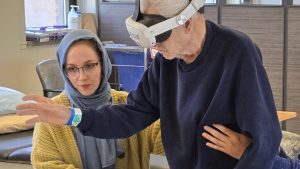CIUSSS du Nord-de-l’Île-de-Montréal drives health and social transformation in Québec through innovative research and advanced technology solutions.
The CIUSSS du Nord-de-l’Île-de-Montréal (CIUSSS NIM) is a leading health and social services provider in northern Montréal, Québec, Canada. Serving approximately 430,000 residents, CIUSSS NIM is an essential part of Québec’s healthcare system, known for its extensive range of services that include primary care, home care, long-term care, correctional facility healthcare, and specialised hospital care.
The CIUSSS NIM operates 29 facilities, including five hospitals, a multiservice centre, ten long-term care centres, six local community service centres, six specialised clinics, a multidisciplinary centre, and a birth house.
Additionally, it extends specialised services to about 2.6 million patients from other regions of Québec. The community it serves is characterised by a significant aging population, ethnocultural communities, and youth facing exclusion or immigration challenges. This comprehensive service offering makes CIUSSS NIM a unique environment for healthcare innovation and research.
The diverse CIUSSS NIM research ecosystem
The CIUSSS NIM research community is a collective of approximately 250 researchers and over 500 students. While the primary affiliation of our researchers is with the University of Montréal, other affiliations include the Université du Québec à Montréal (UQAM), McGill University, Concordia University, École de technologie supérieure (ÉTS), Université du Québec à Trois-Rivières (UQTR), and Université du Québec en Outaouais (UQO). These different affiliations enable us to offer complementary support to our researchers, enhancing their ability to conduct cutting-edge research.
Our research infrastructures support more than 850 projects involving both animal and human studies, including 50 clinical trials, that are organised around four strategic axes: Traumatology and acute care; brain function (sleep, neurodevelopmental disorders, and mental health); health promotion, disease prevention, and chronic disease management; and social research and public health. Across these research axes, the centre is nationally and internationally recognised for several themes:
Integrated traumatology
The newly delivered Integrated Trauma Center (CIT) is a unique environment for research and innovation in trauma care. It is located at Hôpital du Sacré-Cœur-de-Montréal, whose emergency receives over 63,000 patients annually and is one of the busiest in Canada. The CIT is a supraregional reference centre for adult tertiary trauma care and a centre of expertise for spinal cord injuries in western Québec.
It is also a reference centre for severe trauma cases, including road accidents, stab and gunshot wounds, and severe injuries. The CIT is designed to bring together state-of-the-art clinical services and facilities, teaching spaces, and research laboratories in a single shared space.
This promotes interaction between clinical, research, and teaching missions focused on trauma and also favours interdisciplinary and intersectoral collaboration.
Sleep medicine
The Center for Advanced Research in Sleep Medicine (CARSM) is a leading institution in sleep medicine, uniting over 120 professionals, including 20 researchers, with expertise in various sleep-related fields.
It is equipped with seven rooms for comprehensive sleep recording. CARSM’s objectives include studying the molecular and neuronal mechanisms of sleep, developing and validating diagnostic methods, and creating innovative treatments.
The centre is also dedicated to disseminating knowledge and raising awareness about the importance of quality sleep. CARSM has structured two important databanks. The Canadian Biobank for Sleep Research has over 40,000 biosamples (DNA, blood and blood components, saliva) supporting research into the identification of biological and genetic markers of sleep pathologies, circadian rhythms or states of consciousness, as well as their overlap with normal aging, neurodegenerative or psychiatric diseases.
Additionally, CARSM hosts a bank of nights that includes 30,000 polysomnography records, providing invaluable data for advanced analysis, including those based on artificial intelligence. This unique combination of clinical practice and advanced research positions CARSM at the forefront of sleep medicine.
Child psychiatry
The Hôpital Rivière-des-Prairies (HRDP) is a premier institution specialising in youth mental health, housing the largest Pediatric child psychiatry department in Québec with 29 child psychiatrists. HRDP focuses on the evaluation, diagnosis, treatment, research, and teaching in fields such as autism spectrum disorders, cognitive disorders, and sleep disorders.
The hospital’s approach is rooted in empirical methods, integrating clinical practice and research. In addition, HRDP maintains databases to support its research, including a mental health database containing sociodemographic, morphometric, psychometric, and psychosocial data of children and adolescents diagnosed with mental illnesses.
The autism database holds clinical and psychometric data from over 1000 autistic and neurotypical participants, with neuroimaging data available for 200 of these individuals. This data aids in understanding the neurocognitive characteristics associated with autism and the heterogeneity of its phenotype.
Behavioural medicine
The Montreal Behavioural Medicine Centre (MBMC) is an academic research and training centre that focuses on behavioural medicine and psychophysiology.
The MBMC’s research, which focuses on respiratory and cardiovascular diseases and their risk factors, falls into three broad categories: Behavioural, epidemiological cohort studies, which examine the impact of psychological, social and behavioural factors on chronic disease; laboratory experimental studies, which explore the psychophysiological mechanisms linking psychological and behavioural factors to disease; and intervention studies, which evaluate the effectiveness of behavioural medicine interventions on the primary and secondary prevention of chronic disease.
A key initiative of the MBMC is its involvement in the International Behavioural Trials Network (IBTN. With over 1300 members from 72 countries, the network co-founded by researchers from the MBMC aims to enhance the quality of global behavioural trials, build networks, and develop a repository of resources on behavioural trials and intervention development.

Embracing transdisciplinary Research
While research at the CIUSSS NIM is defined by guiding themes, transdisciplinary research remains central to our approach as a manner of unifying our different stakeholders in the same entity. More importantly, we have created an environment that favours the transmission of theoretical and practical knowledge. This vision was incorporated into the design of the CIT but is also exemplified by the Centre Jean-Jacques-Gauthier (CJJG).
Operating as a ‘living lab,’ the CJJG facilitates interactions among researchers, healthcare professionals, and community members to address complex health issues, such as chronic diseases, wellness, and aging, using multiple perspectives. In close proximity, experts from diverse fields – including nutrition, cardiology, respiratory health, and urban health – ensure that research and solutions that result from it are rooted in real-world needs and practical applications, aiming for sustainable health outcomes.
Our transdisciplinary approach has yielded tangible results, particularly in the area of concussion research. Our researchers studying contact sports are integrating online monitoring with wearable technologies, sideline testing for immediate biomarker collection, and a multidisciplinary hospital-based platform for comprehensive individual assessments. These work together to streamline concussion studies, facilitating the tracking of risk factors before, during, and after injuries.
Furthermore, researchers from the CIUSSS NIM partnered with local groups to engineer and test an innovative football helmet that was a finalist in the NFL Helmet Challenge. This project advanced helmet technology and demonstrated the practical impact of our research, showcasing how collaborative innovation can lead to safer sports equipment. Importantly, these initiatives highlight our commitment to addressing complex health issues such as concussions from multiple angles.
These centres of excellence, alongside other areas of expertise at CIUSSS NIM, contribute to a substantial flow of clinical data and interdisciplinary research. The organisation’s commitment to advancing healthcare through innovation is embodied in its vision: “Together, proud and passionate, we innovate to create a healthy world.”
CIUSSS NIM addresses the evolving healthcare needs of its community by fostering partnerships with medical clinics, community pharmacies, educational institutions, and community organisations. This collaborative approach enhances the richness and diversity of data collection, enabling CIUSSS NIM to deliver tailored and effective healthcare solutions.
In addition to his research centre, CIUSSS NIM plays a pioneering role in shaping the future of healthcare in Québec and beyond by integrating innovative technologies and practices through the NIM Intelliance Innovation Center.
The NIM Intelliance Innovation Center: Driving health innovation in Québec
Since its launch in January 2022, the NIM Intelliance Innovation Center has quickly become a key player in Québec’s healthcare innovation landscape. As a central part of the CIUSSS NIM, the centre addresses the critical challenges facing the healthcare system through innovative technological solutions.
The Innovation Center aims to facilitate the development, evaluation, and integration of technological innovations that address specific problems identified by healthcare teams. Its mission aligns with improving access to care, enhancing the operational excellence of healthcare teams, and ensuring the well-being and retention of staff.
The centre supports various stakeholders, including healthcare teams, companies, and the broader ecosystem, providing a comprehensive range of services designed to foster innovation from ideation to adoption.
Key achievements and extensive network
Since its inception, the Innovation Center has launched and completed several major innovation projects totalling $4.6m. Among the notable projects are:
Innovative home care platform
In collaboration with the Montréal -based company AlayaCare, the centre adapted this leading home care technology platform to meet the needs of Québec’s home nursing teams. The project evaluated the clinical and economic impacts, aiding decision-makers in adopting this innovative platform for home care.
Virtual reality rehabilitation platform
Developed by NeuroGroup XR, Kinesix VR is a specialised virtual reality training platform designed by therapists to enhance patient recovery through innovative AI-based hand tracking and real-time feedback indicators. The centre evaluated the platform’s acceptability by clinicians and patients and its clinical and economic impacts and identified barriers to adoption to improve the product’s integration into healthcare settings.
Virtual twin project
In collaboration with BioTwin, this innovative project involves creating digital twins of patients to predict health outcomes better and personalise treatment plans. The centre’s evaluation of this technology has shown promising results in improving patient care and operational efficiency.
The NIM Intelliance Innovation Center is a member of several networks across Québec and Canada. This involvement enhances its presence in Québec’s healthcare ecosystem and beyond. The centre has participated in over 20 conferences and workshops, served on eight selection committees for funding programmes, and collaborated with more than 50 innovative companies.
It has also initiated collaborations outside Québec, notably with Ontario and France.
Comprehensive service offering
The Innovation Center provides a broad spectrum of services to enterprises and healthcare institutions within Québec and Canada. These services include:
- Clinical advice: Offering clinical insights on client/market needs to develop innovations that address real problems.
- Collaboration for development: Through the Innovation Center, companies have access to clinicians and researchers to develop and refine their innovations.
- Funding identification: Helping to identify potential funding sources for innovation projects.
- Impact evaluation: Through standardised impact evaluations, validate and document the real-world value of innovations to facilitate their adoption
The centre’s expertise in impact evaluation is widely recognised. It has collaborated with ten institutions on several evaluation projects, demonstrating its ability to work with other organisations to rigorously and effectively measure the impact of innovation projects.
The Innovation Center offers personalised support for innovation projects, helping healthcare teams analyse the root causes of problems, identify potential solutions, and implement pilot projects. It provides comprehensive impact reports and deployment methodologies to aid decision-making and offers support throughout the innovation lifecycle.
Future vision and goals
Looking ahead, the NIM Intelliance Innovation Center aims to expand its impact by launching new innovation projects, extending its evaluation services to more healthcare institutions, and fostering greater collaboration within the health and social ecosystem. The centre is committed to continuing its role as a leader in healthcare innovation, driving improvements in patient care and operational efficiency.
The Innovation Center is a testament to CIUSSS NIM’s commitment to healthcare innovation. By addressing critical challenges, fostering collaboration, and leveraging multidisciplinary expertise, the Innovation Center is transforming healthcare delivery and improving patient outcomes in Québec. Its ongoing efforts and achievements highlight its pivotal role in shaping the future of healthcare, both within the province and beyond.
Please note, this article will also appear in the 19th edition of our quarterly publication.









